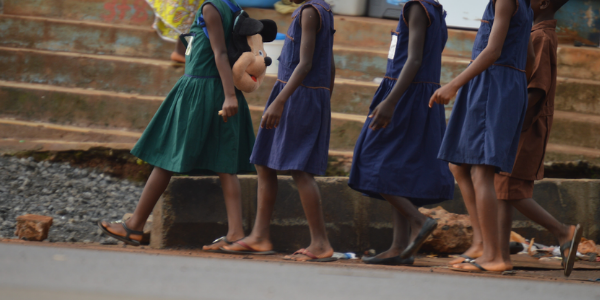2017 DECEMBER UPDATE: We are committed to finding solutions to protect students from the abuses that came to light during our 25 Conversations in 25 Schools initiative. Equality Now is holding a national dialogue in Nairobi, Kenya where stakeholders will come together to create solutions to address and prevent violence against girls.
We will also celebrate grassroots activists, who are going above and beyond to help young girls get justice for female genital mutilation (FGM), sexual violence, sex trafficking, and child marriage violations.
We know that by empowering young people to advocate for themselves, whole communities can be transformed. That is why this year, in honor of our 25th anniversary, we have pledged to host 25 “chats” in 25 secondary schools across Kenya and other African countries to help make sure that young people grow up knowing their rights. There are more youth living in Africa than in any other part of the world. As the next generation of human rights defenders, these young people have already begun changing the world. Our core learning from our work with girls has taught us that when girls (and boys) know their rights and have a supportive environment to voice their ideas and concerns without fear, stigma or disbelief, they can create real change in their own lives and for other girls like them.
The conversations have been eye-openers, giving us the welcome opportunity to not only answer questions and give advice, but also to learn more about the issues and challenges they are facing and to see where the law can, hopefully, play a part. We want to hear directly from youth about how they envision “My Africa” and gender equality. Staff from our Nairobi office started the talks in May, and after visiting several schools it became clear that the students needed a bigger outlet and more support to deal with the topics that were being discussed.
“Such conversations will keep us grounded in our work on human rights. Sometimes we focus on the legal and policy issues and forget the real ones on the ground. They keep us current and it’s a way of giving back. It should not end here.” – Flavia Mwangovya, Senior Program Officer, Legal Equality
Today, on the Day of the African Child, we want to share some key messages, because, as we’re learning, these students are saying things that we all need to hear.
1. SEXUAL VIOLENCE
At one school, almost every girl student who submitted a question asked about sexual violence. In several cases, these questions had to do with their own experiences with assault and rape, which they had not previously shared with anyone. At one school, our one and a half hour session stretched into four hours as we attempted to answer as many questions as possible.
In several schools, we also learned teachers were taking advantage of the students and forcing them to trade sex for good grades.“I was faced with the reality of sex for grades when I held two conversations in schools of children aged below 16. I was confronted by this reality that teachers are taking advantage of children and they have nowhere to go.” – Naitore Nyamu, Program Officer, End Sexual Violence/Justice for Girls
2. LAWS ARE NOT BEING ENFORCED
Students also said they weren’t seeing national laws being upheld in their communities, especially related to female genital mutilation (FGM) and child marriage.“It seems there is a disconnect between advocacy and policy change and what is on the ground. How do we have deliberate connections with the development operators?” – Jean Paul Murunga, Program Officer, End Harmful Practices
“With all laws and policies available how do we make them available for a fourteen-year-old girl. How does she get transport to go and seek help, the confidence, the protection?” – Grace Uwizeye, Program Officer, End Harmful Practices
3. EDUCATING THE EDUCATORS
It became clear that we need to better equip teachers and families to talk about these issues at home and in school. Schools should be safe space not a place where students face sexual violence and exploitation.“Where are the safe spaces for girls in schools? The guidance and counseling teachers have no clue of how to help the girls. The conversations unearthed issues that teachers weren’t aware of.” – Florence Machio, consultant, Africa Office.
These conversations have inspired us to step up our efforts to keep girls safe at home, at school and in their communities. We want to make sure every student, not just the ones we are able to visit, has a network of support from the ground up.
As a first legal step, we are in the process of contacting Kenya’s Chief Justice and are seeking to work with the Kenyan Ministry of Education to advocate for policy shifts so that more students have access to safe spaces. We are also teaming up with local partners skilled in community outreach and social work to establish an infrastructure that will give these girls ongoing access to information and justice.
As we move forward in our work we will continue to update you on our progress and how you can get involved.
Since 1991, the Day of the African Child has been held in memory of thousands of South African students who were killed or injured while marching in Soweto for their right to a quality education on 16 June 1976. In honor of those brave student activists, please Take Action for African children today!
Take Action to Let Girls Learn in Sierra Leone
